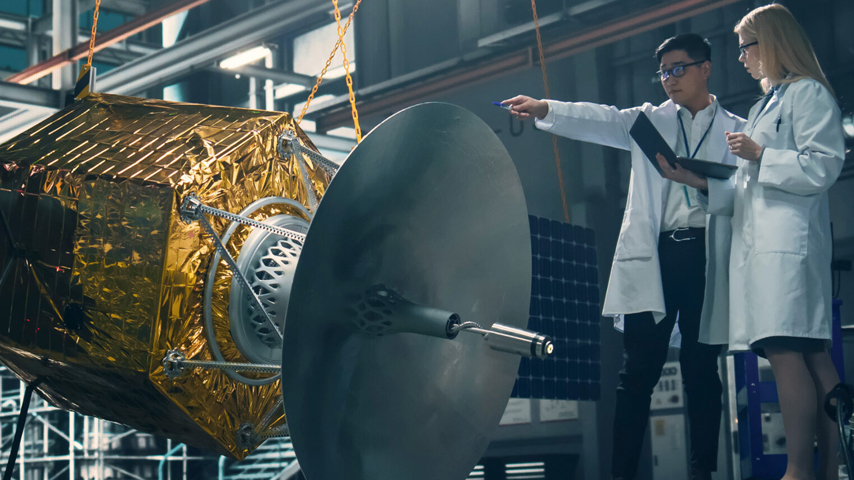Growing the Space Engineering Ranks
Growing the Space Engineering Ranks


A program called Space Workforce 2030 is fostering a new generation of diverse and talented engineers.
As the race to advance further into space drives more and more entities around the world to pursue space travel and research efforts, the need for greater numbers of talented engineers to develop these solutions grows more acute. To support that growth and to remain on the cutting edge of innovation, a strong, vibrant, and inclusive workforce is critical.
A program called Space Workforce 2030 (SWF2030), established at the 37th Space Symposium in March 2022, is a collaborative effort helping to draw in a new generation of engineers to the space industry while also ensuring that it is more diverse and talented.
SWF2030 is meant to significantly increase the number of women and underrepresented groups in the technical workforce as well as aerospace engineering programs and senior company leadership. It will also sponsor K-12 programs to reach underrepresented students.
To achieve this, the program has “three different Centers of Excellence [COE] and they align with the U.S. National Space Council commitment—Inspire, Prepare, as well as Employ,” explained Via Van Liew, principal director of diversity, equity, and inclusion at The Aerospace Corporation, a nonprofit, federally funded research and development center focused on solving problems facing U.S. space programs that is leading SWF2030. “Underneath our K-12 level, we have combined efforts from all of our member companies and we've actually surpassed our goal of reaching more than 5 million students through STEM outreach efforts.”
Listen to the Podcast: Space Workforce 2030
SWF2030’s Inspire COE established a partnership with the Girl Scouts of America, for one, hosting more than 125 Girl Scouts at the Space Foundation’s discovery center in Colorado Springs this past spring as part of the continued effort to bring STEM education to K-12 students.
Under the Prepare COE is the National Space Intern Program, which offers a “central touch point” and platform where students can register "to reach our space industry companies for an opportunity for internships,” Van Liew said. “We actually welcomed students this past summer into this program and we had a successful launch.”
The intern program aspires to hire at least 3,000 diverse individuals by summer 2030. (Applications for the 2024 program are open.) A total of 994 students applied for the 2023 internships.
That included Arianna Villegas, a second-year Ph.D. student studying mechanical engineering at the University of Texas at El Paso.
“When I took my first internship with The Aerospace Corporation in 2022, I didn't really know anything about the aerospace industry. My university didn't offer aerospace courses,” Villegas recalled. “I went ahead and gave it a shot, and I loved it. I ended up going back with them this past summer for my second internship with them. And then that's when I heard about [SWF2030].”
For Villegas, the program has been a gateway to getting to know the aerospace industry, especially for underrepresented students who may not have existing connections.
Become a Member: How to Join ASME
“I really love the networking aspect. I think the program has allowed us to grow in a sense by interacting with people that are in the same industry that we're interested in, instead of just kind of pushing us into the industry and having us learn by ourselves and having to network on our own,” she added. "I can reach out to other individuals, even other students that are also going through their education just like I am.”
As for the Employ COE, the 30 member companies that have committed to the SWF2030 pledge, including The Aerospace Corporation, are coming together to share best practices and to help one another to make sure that goals are achieved, Van Liew added.
“I'm really proud of all the companies that are participating within this program. They have been transparent, they're just open sharing their data,” she continued. “They came together to provide their data so that we can track our progress toward our commitments. That's to guide and to focus our efforts for the coming year.”
Member companies are also sharing best practices to help one another make and achieve measurable goals that will actually impact the pledge and the program’s continuation, Van Liew said.
You Might Also Enjoy: Fair Internships Make for Entry-Level Equity
Moving toward the SWF2030’s second anniversary in 2024, leadership is continuing to explore and develop new ways to engage aerospace engineering majors as well as minors at historical black colleges and universities, she continued.
“We’re also utilizing this as a new networking opportunity for diverse engineering professors too. Then with our National Space Intern Program, we are hosting a virtual networking event,” Van Liew said. “So this is going to be an invitation to students to come meet our partner companies and to have an opportunity to be considered for an internship program.”
A noteworthy concept playing out with SWF2030 is the space industry's collaboration in sharing an applicant pool to build up their organizations and to improve the technical workforce, all while boosting inclusion of underrepresented groups and women.
Villegas, for one, is continuing with her internship at The Aerospace Corporation remotely as she works on her Ph.D.
“I'm hoping to continue to stay on throughout my entire Ph.D. and continue to see the program grow,” she said, adding that she hopes to see more focus groups or even one-on-one mentorships as SWF2030 evolves.
Louise Poirier is senior editor.
A program called Space Workforce 2030 (SWF2030), established at the 37th Space Symposium in March 2022, is a collaborative effort helping to draw in a new generation of engineers to the space industry while also ensuring that it is more diverse and talented.
SWF2030 is meant to significantly increase the number of women and underrepresented groups in the technical workforce as well as aerospace engineering programs and senior company leadership. It will also sponsor K-12 programs to reach underrepresented students.
To achieve this, the program has “three different Centers of Excellence [COE] and they align with the U.S. National Space Council commitment—Inspire, Prepare, as well as Employ,” explained Via Van Liew, principal director of diversity, equity, and inclusion at The Aerospace Corporation, a nonprofit, federally funded research and development center focused on solving problems facing U.S. space programs that is leading SWF2030. “Underneath our K-12 level, we have combined efforts from all of our member companies and we've actually surpassed our goal of reaching more than 5 million students through STEM outreach efforts.”
Listen to the Podcast: Space Workforce 2030
SWF2030’s Inspire COE established a partnership with the Girl Scouts of America, for one, hosting more than 125 Girl Scouts at the Space Foundation’s discovery center in Colorado Springs this past spring as part of the continued effort to bring STEM education to K-12 students.
Under the Prepare COE is the National Space Intern Program, which offers a “central touch point” and platform where students can register "to reach our space industry companies for an opportunity for internships,” Van Liew said. “We actually welcomed students this past summer into this program and we had a successful launch.”
The intern program aspires to hire at least 3,000 diverse individuals by summer 2030. (Applications for the 2024 program are open.) A total of 994 students applied for the 2023 internships.
That included Arianna Villegas, a second-year Ph.D. student studying mechanical engineering at the University of Texas at El Paso.
“When I took my first internship with The Aerospace Corporation in 2022, I didn't really know anything about the aerospace industry. My university didn't offer aerospace courses,” Villegas recalled. “I went ahead and gave it a shot, and I loved it. I ended up going back with them this past summer for my second internship with them. And then that's when I heard about [SWF2030].”
For Villegas, the program has been a gateway to getting to know the aerospace industry, especially for underrepresented students who may not have existing connections.
Become a Member: How to Join ASME
“I really love the networking aspect. I think the program has allowed us to grow in a sense by interacting with people that are in the same industry that we're interested in, instead of just kind of pushing us into the industry and having us learn by ourselves and having to network on our own,” she added. "I can reach out to other individuals, even other students that are also going through their education just like I am.”
As for the Employ COE, the 30 member companies that have committed to the SWF2030 pledge, including The Aerospace Corporation, are coming together to share best practices and to help one another to make sure that goals are achieved, Van Liew added.
“I'm really proud of all the companies that are participating within this program. They have been transparent, they're just open sharing their data,” she continued. “They came together to provide their data so that we can track our progress toward our commitments. That's to guide and to focus our efforts for the coming year.”
Member companies are also sharing best practices to help one another make and achieve measurable goals that will actually impact the pledge and the program’s continuation, Van Liew said.
You Might Also Enjoy: Fair Internships Make for Entry-Level Equity
Moving toward the SWF2030’s second anniversary in 2024, leadership is continuing to explore and develop new ways to engage aerospace engineering majors as well as minors at historical black colleges and universities, she continued.
“We’re also utilizing this as a new networking opportunity for diverse engineering professors too. Then with our National Space Intern Program, we are hosting a virtual networking event,” Van Liew said. “So this is going to be an invitation to students to come meet our partner companies and to have an opportunity to be considered for an internship program.”
A noteworthy concept playing out with SWF2030 is the space industry's collaboration in sharing an applicant pool to build up their organizations and to improve the technical workforce, all while boosting inclusion of underrepresented groups and women.
Villegas, for one, is continuing with her internship at The Aerospace Corporation remotely as she works on her Ph.D.
“I'm hoping to continue to stay on throughout my entire Ph.D. and continue to see the program grow,” she said, adding that she hopes to see more focus groups or even one-on-one mentorships as SWF2030 evolves.
Louise Poirier is senior editor.



